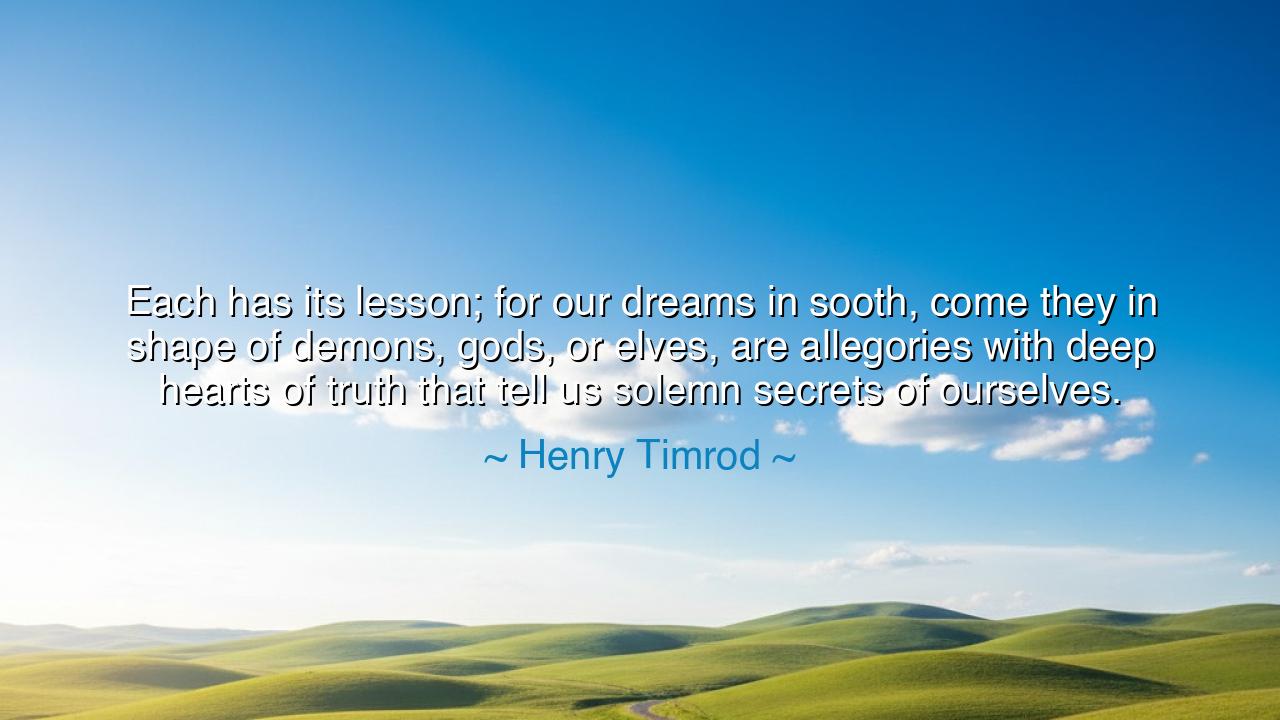
Each has its lesson; for our dreams in sooth, come they in shape
Each has its lesson; for our dreams in sooth, come they in shape of demons, gods, or elves, are allegories with deep hearts of truth that tell us solemn secrets of ourselves.






In the words of Henry Timrod: “Each has its lesson; for our dreams in sooth, come they in shape of demons, gods, or elves, are allegories with deep hearts of truth that tell us solemn secrets of ourselves.” These words are not mere poetry — they are a revelation of the hidden dialogue between the soul and its own shadow. Timrod, the “Poet Laureate of the Confederacy,” wrote in a time of conflict and sorrow, yet his vision reached beyond history into the timeless realm of the human spirit. He saw in dreams not the random wanderings of sleep, but sacred messages — allegories whispering truths that waking minds cannot bear to utter. His words remind us that within every dream, even the darkest, there is a lesson meant to unveil who we truly are.
In the ancient world, the wise did not dismiss dreams as illusions. The Egyptians placed them among the gifts of the gods; the Greeks built temples where the sick slept, hoping to receive healing visions from Asclepius. And the prophets of old — Joseph, Daniel, Ezekiel — all heard divine messages through the veil of dreams. These were not idle fantasies, but symbols, woven from the deepest fibers of the human soul. Timrod continues this lineage of wisdom, declaring that every dream, whether it comes as a demon, a god, or an elf, bears within it a mirror — a reflection of what we have forgotten, denied, or longed for in silence.
Consider the story of Carl Jung, the modern seer of the psyche. In the early 20th century, he began to write down his dreams — wild, terrifying, radiant visions of serpents, towers, and crimson seas. In them, he met both angels and monsters, and from them, he built the foundation of depth psychology — the study of the soul’s hidden language. Jung came to see what Timrod had already sung: that every figure in a dream is not an intruder, but a fragment of our own being, come to teach us something we have refused to learn in the daylight of reason. Dreams, he said, are the theater of the soul.
To the unwise, the demon in the dream is an enemy. To the awakened, it is a messenger. For even our fears are truths wearing masks — the truth of our weaknesses, our wounds, or our untamed power. The god may appear not to bless, but to challenge; the elf, not to delight, but to remind us of the innocence we abandoned. Timrod’s verse calls us to read these symbols not as fantasy, but as allegories — stories written by the hand of our own spirit, teaching us through image and emotion what cannot be spoken in words.
And so, when Timrod says, “Each has its lesson,” he invites us to humility. For the soul is vast and ancient, and it speaks in riddles. We must learn to listen. When sorrow visits your sleep, do not turn away. Ask what it seeks to reveal. When joy bursts unbidden through your dreams, know that it too carries a truth — perhaps the echo of something you once loved and must love again. In this way, life itself becomes a dream, a continuous unveiling of meaning hidden beneath appearances.
The wise man or woman does not flee from dreams, nor dismiss them as madness. They dwell upon them in the morning light, pondering as the ancients did: “What does my soul wish me to know?” Keep a book beside your bed; write down what you see in the realm of night. Over time, patterns will emerge — warnings, encouragements, truths you have long ignored. These are not the tricks of sleep; they are the secrets of yourself, seeking voice.
Thus, let this teaching be your guide: the outer world shows you where you stand; the inner world shows you who you are. To know yourself, you must walk both. When you embrace the dream, you embrace the depths of your own being. For within the shadow of every demon, there glows the ember of wisdom; within every god, the reflection of your highest self; and within every elf, the laughter of your forgotten innocence. Listen to them — for they are you — and in knowing them, you shall come to know the infinite truth of your own soul.






AAdministratorAdministrator
Welcome, honored guests. Please leave a comment, we will respond soon